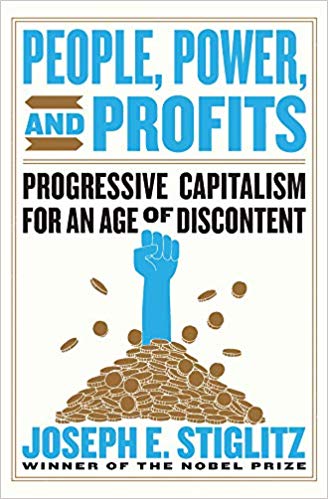Book Review “ People, Power, and Profits: Progressive Capitalism for an Age of Discontent ” by Joseph. E. Stiglitz (published by W.W. Norton & Co, April 23, 2019)
Joseph Stiglitz’s latest book, People, Power, and Profits: Progressive Capitalism for an Age of Discontent (published by W. W. Norton & Company) immediately created waves, and was dubbed a “manifesto” by CNBC journalists who interviewed him upon the release of the book (April 22, 2019).
 A manifesto is not the way I would describe it. The book is a manifesto only in the sense that it has a major policy indictment: American-style capitalism is broken and has been broken for the past four decades because of political mistakes; President Reagan in the US and Margaret Thatcher in the UK stand accused, along with their ideologue Milton Friedman and the Chicago School of economists who cooked up theories to defend corporate interests – at the expense of workers and the middle class.
A manifesto is not the way I would describe it. The book is a manifesto only in the sense that it has a major policy indictment: American-style capitalism is broken and has been broken for the past four decades because of political mistakes; President Reagan in the US and Margaret Thatcher in the UK stand accused, along with their ideologue Milton Friedman and the Chicago School of economists who cooked up theories to defend corporate interests – at the expense of workers and the middle class.
But the book is also about how to fix it. About the policy measures that need to be taken to put America on the road to economic and political recovery. Because as of now, it’s not just American-style capitalism that is broken, American democracy is broken too. With Trump packing the judiciary, and especially the Supreme Court – the watchdog of society’s rules – American democracy has been turned into a plutocracy. No longer the government of the majority, but of the minority, governed by the interests of the ultra-rich.
This all sounds like political messages, but in fact, People, Power and Profits goes far beyond a policy statement. It’s a serious economic analysis based on the latest, most extensive investigations and surveys carried out by top universities and economists. Stiglitz builds his case on data from the Federal Reserve, the Bureau of labor Statistics, the National Bureau of Economic Research, the Bureau of Economic Analysis, the OECD, the IMF, the World Bank, the Pew Research Center, Brooking Institution, Peterson Institute and countless others.
This is one of the rare books where reading the footnotes is a must. And a pleasure. Every footnote provides not only the link to the source of data but additional information throwing a deeper light on the argument. In a way, the book is written on two levels: without the footnotes, it’s a fast read focused on a clear, simple message, in others words, something like a “manifesto”. With the footnotes, it’s an economic essay that encapsulates the findings of the last 40 years of research in economics. It builds on every major finding of top economists, from Anthony B. Atkinson, David H. Autor and Daron Acemoglu to Emmanuel Saez and Robert Shiller, not forgetting Mordecai Kurz and Thomas Piketty or the giants of the 20th century, Arrow and Galbraith.
All this makes the proposed solutions all the more convincing.
Yet the hype surrounding his latest book should not surprise us. Every time Stiglitz comes out with a new book, people react. Because, as Paul Krugman said, he is “an insanely great economist”.
Stiglitz, in his long professional career, was chairman of the Council of Economic Advisers under President Clinton, chief economist of the World Bank, and named by Time as one of the 100 most influential individuals in the world. He now teaches at Columbia University and is chief economist of the Roosevelt Institute.
This position at the Roosevelt Institute matters. The Institute, created in 1987 through the merger of the Eleanor Roosevelt Institute and the Franklin D. Roosevelt Four Freedoms Foundation, is both a think tank and a campus network with 130 chapters in nearly 40 states. It has a powerful motto: “Let’s reimagine the rules”.
The Institute’s mission is to restore democracy “by the people, for the people”, as it says in its mission statement:
The few at the top—corporations and the richest among us—hold too much wealth and power today, and our society will be stronger when that changes. Armed with a bold vision for the future, we want our work to move the country toward a new economic and political system: one built by many for the good of all.
In short, Stiglitz is not your run-of-the-mill economist hiding in an ivory tower.
His books are not academic disquisitions. They all have a political message built on solid economic analysis. And Stiglitz is regularly involved in politics. Notably in 2015, when he offered in a report published by the Roosevelt Institute, aptly titled ““Rewriting the Rules of the American Economy: An Agenda for Growth and Shared Prosperity”.
The report was in fact a devastating indictment of 35 years of U.S. economic policies. It makes 37 policy recommendations, including proposing progressive taxation and a large expansion of government programs. Stiglitz got the support of Senator Elizabeth Warren and New York Mayor Bill deBlasio who attended the press conference announcing the report.
Inequality is a major concern for Stiglitz, all his books address the issue. Including, in recent years, several major best sellers, Globalization and its Discontents Revisited: Anti-Globalization in the Age of Trump (2017), The Price of Inequality (2012), and Freefall: America, Free Markets and the Sinking of the World Economy (2010).
In People, Power and Profits, inequality takes center stage, as he explains his book to Democracy Now!:
Perhaps the only recent book in which inequality isn’t a central issue is the one I reviewed for Impakter in 2016: The Euro: How a Common Currency Threatens the Future of Europe. It is an important (if dismal) assessment of the travails of the Euro and Europe, claiming that the damage done by the Euro runs so deep that nobody in Europe really wants the Euro anymore. I believe that this claim was more pessimistic than necessary, nowadays most Europeans, in the light of the Brexit disaster, realize the value of the Euro and no longer wish to leave it. Yet Stiglitz’s analysis of the Euro is remarkable and some of his proposals, though fairly radical, make sense.
In other words, one may not always fully agree with Stiglitz but one needs to listen. What he says matters tremendously. And this time, in People, Power and Profits which is focused on America’s travails arising from inequality and globalization, he has come up with yet another radical solution that goes by an arresting name: “progressive capitalism”.
The concept of progressive capitalism is brilliant, an apparent contradiction in terms. Yet it’s not an oxymoron, as he argues in an opinion piece in the New York Times. In spite of his criticism on the “free market” à la Milton Friedman, he still believes in it: “We can indeed channel the power of the market to serve society,” he writes.
With Trump at the helm of America, the outlook is dire if nothing is done. As he writes:
We are now in a vicious cycle: Greater economic inequality is leading, in our money-driven political system, to more political inequality, with weaker rules and deregulation causing still more economic inequality.
The cycle needs to be broken. The solution, says Stiglitz, is not to turn America into Denmark. Scandinavian-style socialism that protects workers may be attractive, they show the way to go but America needs its own solution, recognizing the role of capitalism. But Americans need to learn how to curb its excesses.
In short, we must be “as resolute in combating market power as the corporate sector is in increasing it.”
If only we had done so, he notes regretfully, the opioid crisis might have been curbed and the 2008 financial crisis avoided. If more had been done to hold the banks accountable and “blunt the power of oligopolies and strengthen the power of workers”, the current “sense of powerlessness” and lack of trust in institutions might not be so pervasive as it is today.
Stiglitz spells out exactly what needs to be done. The book is a road map to American recovery, or as he puts it in his last chapter, to “reclaiming America”. The way forward to restoring democracy, reducing the power of money in politics and relaunching the economy.
Chief among the required steps is the need to curb campaign spending: “Citizens United, the Supreme Court case that effectively allows the unlimited spending of money on political campaigns needs to be reversed” he writes.
A “greater role” must be assigned to government to “enable most citizens to have the middle-class life to which they aspire”. This means “stronger and better-enforced competition laws and better management of globalization and our financial sector”. It also means: spending on infrastructure, creating a “learning society”, encouraging education and research. Last but not least, it means remaining an “open society” to both ideas and people, welcoming the “flow of knowledge across borders”.
The future will require the US (and Europe) to adapt to the challenges of a post-industrial world. This, argues Stiglitz, is “where markets need the help of government”. There is an essential role for government “to facilitate the transition through what have been called active labor market and industrial policies”. It’s not just a matter of job training but of having place-based policies, “to help restore and revitalize communities”.
For Stiglitz, an overarching goal is: “Decent jobs with good working conditions” and ensuring full employment. And he is a believer in using fiscal policy (taxes): “If the taxes and spending are chosen carefully, the boost to the economy – and thus the job market – can be very large”.
Ms Merkel and German economists enamored with balancing the budget every year, take note.
Remarkably, Stiglitz is skeptical of one of Silicon Valley’s dearest solution Universal Basic Income. He finds the idea “intriguing” but “simply providing income” is not the right approach. “For most people work is an important part of life”, he notes. Instead of UBI, Stiglitz favors shorter hours as “they actually lead to more productivity”.
This, of course, is a debatable point: France’s recent experiment with shorter hours, the famous 35-hour working week that was part of a labor reform adopted in France, in February 2000, under Prime Minister Lionel Jospin’s Plural Left government has been a resounding failure and cost the economy lost growth.
As I have argued in a recent Impakter article, UBI certainly is not “the solution” and a better approach is Utility-Added Income to be applied to underpaid jobs in the services industry.
There are many more ideas in Stiglitz’s book that make it a must read for anyone concerned with the future of America, but I’d like to end on what is perhaps his most radical one:
In twenty-first-century America, we should recognize a new right – the right of every person able and willing to work to have a job. And if the market fails, and if our fiscal and monetary policies fail, the government needs to step into the breach.
And if you think that would be a gift to lazy people with useless made-up jobs, Stiglitz reminds us that there’s “much work that needs doing”: many schools need to be repaired, city streets need to be cleaned and beautified. And he adds in a footnote: “Evidence elsewhere shows the impact of such efforts not only on the quality of life but even encouraging learning and discouraging crime”.
They say the devil is in the details, but in this book, there is plenty of truth in footnotes. When you read it, don’t skip them.









